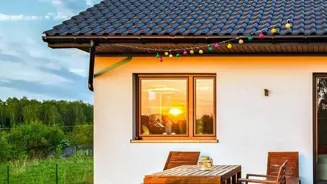Discover 7 easy ways to transform your home into a sustainable haven. Let's make a difference together!
In today's world, "sustainability" and "eco-friendly" are buzzwords everyone's throwing around, but
making your home truly green isn't just a trend – it's a responsibility, ya know?
It's about making smart choices that not only protect the environment but can also save you some decent money in the long run. Plus, a more sustainable home is often a healthier and more comfortable home.
So, grab a cuppa and let's dive into seven easy-peasy ways to make your home a little kinder to Mother Earth, shall we? You don't need to be a rocket scientist or a millionaire to do it; just a little awareness and a willingness to make some small adjustments.
Embrace the Power of Natural Light and Energy-Efficient Lighting
First things first, let's talk about lighting, bhai! So many of us are still relying on those old, energy-guzzling bulbs when there are much better options available. Start by maximizing the natural light in your home. Open up your curtains and blinds during the day and let the sunshine in.
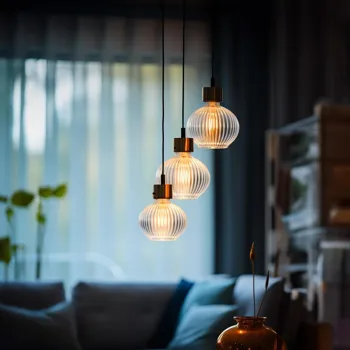
Not only will it brighten up your space, but it'll also reduce your need for artificial lighting. Next, switch to energy-efficient LED bulbs.
They use significantly less energy than traditional incandescent bulbs and last much longer, saving you money on your electricity bill and reducing your carbon footprint. Think of it as a win-win situation! And remember to switch off lights when you leave a room.
It's such a simple habit, but it can make a big difference over time. You can even install motion sensors in areas like hallways or bathrooms, so the lights turn on only when someone's there. Small changes, big impact, eh?
Water Conservation: Every Drop Counts, Boss!
Paani is life, as they say, so conserving water is crucial. We’re talking about serious stuff here, folks. Start by fixing any leaky faucets or pipes. Even a small drip can waste a surprising amount of water over time. Imagine all that precious water, just going down the drain unnecessarily!
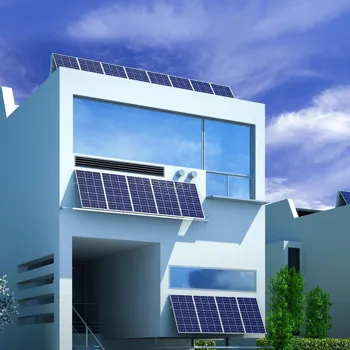
Install low-flow showerheads and toilets. These fixtures use less water without sacrificing performance, so you can still enjoy a good shower or flush without feeling guilty. You can also collect rainwater to water your plants or wash your car.
It's practically free water, and it's much better for your plants than tap water, which can contain chemicals. Be mindful of your water usage when doing dishes or laundry. Run full loads and avoid letting the water run unnecessarily.
Even small changes in your daily habits can add up to significant water savings, helping you do your part for the environment and reduce your water bill.
Green Your Garden and Embrace Composting
Time to get your hands dirty! If you have a garden, consider planting native plants. They're adapted to the local climate, so they require less water and maintenance. Plus, they provide food and habitat for local wildlife, which is a bonus.
You can also create a compost bin to recycle food scraps and yard waste into nutrient-rich compost for your garden. Composting reduces the amount of waste you send to landfills and provides a natural fertilizer for your plants. It's like turning trash into treasure!
Avoid using chemical pesticides and fertilizers in your garden. They can harm beneficial insects and pollute the soil and water. Instead, opt for natural alternatives like neem oil or compost tea.
Gardening isn't just a hobby; it's a way to connect with nature and contribute to a healthier environment. And who knows, maybe you'll even grow some delicious fruits and vegetables in the process!
Reduce, Reuse, Recycle: The Holy Trinity of Sustainability
This one's a classic, but it's worth repeating: reduce, reuse, recycle! Before you buy something, ask yourself if you really need it. Can you borrow it from a friend, or rent it instead? Reduce your consumption and avoid buying things you don't need.
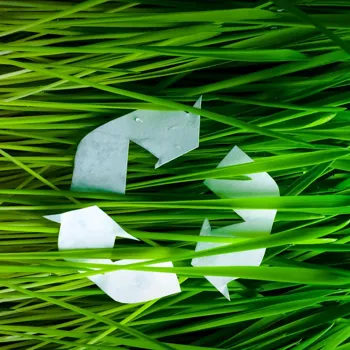
When you do buy something, choose products that are durable and made from sustainable materials. Look for items that are designed to last, rather than cheap, disposable alternatives. Find creative ways to reuse items instead of throwing them away.
Old glass jars can be used for storage, and old t-shirts can be turned into cleaning rags. And of course, recycle everything you can. Make sure you have separate bins for paper, plastic, and metal, and follow your local recycling guidelines.
By reducing, reusing, and recycling, you can significantly reduce your waste and your impact on the environment. It's all about being mindful of your consumption habits and making conscious choices.
Choose Eco-Friendly Cleaning Products
Tired of those harsh chemicals in your cleaning products? Well, there's a better way! Switch to eco-friendly cleaning products that are made from natural ingredients and are biodegradable.
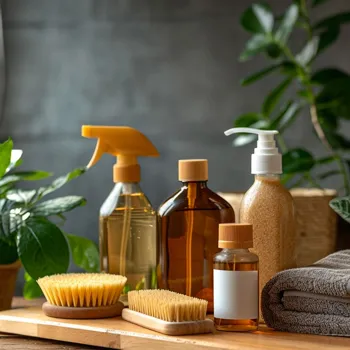
They're just as effective as conventional cleaners, but they're much gentler on the environment and your health. You can even make your own cleaning products using simple ingredients like vinegar, baking soda, and lemon juice.
Not only are they effective, but they're also much cheaper than store-bought cleaners. It's time to ditch the toxic chemicals and embrace a more natural approach to cleaning. Your home will be cleaner, your health will be better, and the environment will thank you for it.
It’s truly a big win for all the good people.
Insulate Your Home and Improve Ventilation
Proper insulation can make a huge difference in your home's energy efficiency. It helps to keep your home warm in the winter and cool in the summer, reducing your need for heating and cooling. Insulate your walls, ceilings, and floors to minimize heat loss or gain.

You can also seal any air leaks around windows and doors with weather stripping or caulk. Proper ventilation is also important for maintaining good indoor air quality. Make sure your home is well-ventilated to prevent the build-up of pollutants and moisture.
Open windows and doors regularly to let fresh air in. Improving your home's insulation and ventilation can not only save you money on your energy bills but also make your home a more comfortable and healthy place to live.
Go Paperless: Reduce Your Paper Consumption
In this digital age, there's really no need to be drowning in paper. Opt for online statements and billing whenever possible. It's more convenient, and it saves trees! Unsubscribe from unwanted junk mail. You can also use a scanner to digitize important documents and store them electronically.
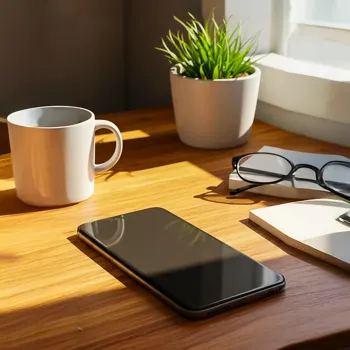
When you do need to use paper, choose recycled paper. It's made from post-consumer waste and it's a much more sustainable option than virgin paper. Reduce your paper consumption and embrace the digital age. It's a simple way to reduce your environmental impact and declutter your home.
